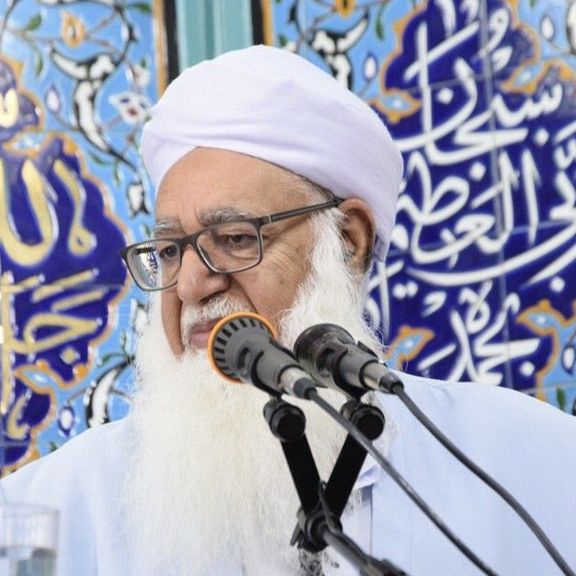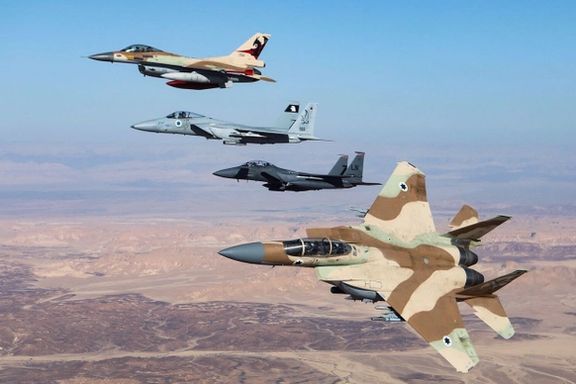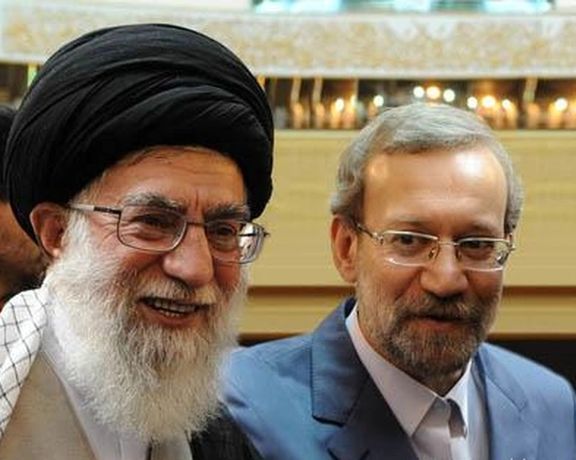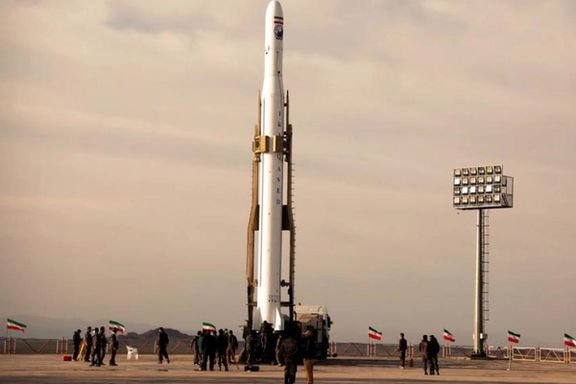Dismissal Of Prominent Sunni Cleric Draws Outrage In Northern Iran

Supreme Leader Ali Khamenei has warned Sunni religious leaders in Iran against any protests to the dismissal of a popular Imam who had made controversial remarks.

Supreme Leader Ali Khamenei has warned Sunni religious leaders in Iran against any protests to the dismissal of a popular Imam who had made controversial remarks.
Khamenei’s representative in Golestan province, with a large Sunni population, earlier this week dismissed Mowlavi Hossein Gorgij, an outspoken and popular religious leader revered by his followers.
The dismissal led to public outrage and protests in the northeastern region in the city of Azadshahr, where Gorgij was the Friday Prayer Imam.
The decision to fire the Sunni cleric was announced as a reaction to some of his remarks that were deemed insulting to Shia sanctities. Gorgij, however, issued a statement afterwards to apologize, clarifying that his speech was misinterpreted, and he meant no disrespect towards the Shias.
Gorgij was sacked by Ali Khamenei’s representative in the province, Kazem Nour-Mofidi, a member of the Assembly of Experts and the oldest Friday Prayer leader in the country.
Nour-Mofidi then appointed a new Imam for Sunni Muslims in Azadshahr. Such interventions by a Shiite official in the Sunni community are rare.
The move against the Sunni Imam, who had earlier condemned the Islamic Republic's police brutality against citizens, has prompted several protests Khamenei's decision across the province.

Current and former Israeli military officials have said that Israel does not have the ability to inflict significant damage on Iran’s nuclear infrastructure.
In recent months Israeli officials, nervous about a new agreement between the United States and Iran, have repeatedly said they will take action to defend their nation if Iran is believed to be close to producing a nuclear bomb.
But The New York Times reported Saturday that current and former Israeli military figures and experts doubt Israel has the capability to destroy or significantly delay Iran’s nuclear program, which is dispersed throughout the large country and some hidden underground.
Experts and officials said that a small-scale attack damaging parts of Iran’s infrastructure might be possible in months while a large attack would take two years to prepare and are currently beyond Israel’s capabilities. One former Israeli general said the only air force capable of a sustained attack is the US Air Force.
Since July 2020, many mysterious sabotage attacks have hit Iran’s sensitive installations, including two devastating explosions at Natanz uranium enrichment site, widely attributed to Israel. These have caused some slowdown, but Iran continues to enrich uranium at higher levels, getting closer to having enough fissile material for a bomb.

Six months after Iran's hardliner Guardian Council barred a former parliament speaker from running for president it has finally tried to defend its decision.
The Guardian Council, a constitutional watchdog vetting candidates and supervised by Supreme Leader Ali Khamenei, offered 7 explanations about Ali Larijani’s disqualification, some simply political in nature and others less than substantiated or not representing any legal prohibition.
One reason given by the Council is a vague reference to Larijani past remarks regarding the disputed 2009 election, when millions protested the decision to announce Mahmoud Ahmadinejad the winner of the presidential race. Conservatives suppressed the protests and called the demonstrators provocateurs. But there is no record of Larijani defending the protesters.
The Council also cited accusations including his son's involvement in dubious contracts with the parliament, some of his relatives' residence in the United Kingdom and the United States which the council described as "belligerent states," frequent visits to foreign countries by Larijani's family members, following a luxurious lifestyle, and sharing responsibility for the undesirable situation of the country.
The letters were exchanged by Larijani and the Guardian Council in September, but they were released by the press on Saturday.
The Council also disqualified other strong candidates in what the many saw was a blatant attempt to ensure a win for Ebrahim Raisi, the current president.
Earlier, Larijani had repeatedly called on the Council to let the public know why he was barred from running, but the council replied that it would not be in Larijani's interest.
Following the disqualification, his brother Sadeq Larijani who was a member of the Guardian Council, protested the decision and charged that it was based on wrong information given to the council by IRGC's intelligence organization.
Later Supreme Leader Ali Khamenei called on the Guardian Council "to make up for its unfair treatment" without actually mentioning Ali Larijani.
Meanwhile, Ali Larijani wrote a strongly worded reply to the Council's Secretary, hardline cleric and politician Ahmad Jannati explaining that one of his children lives in the United States where he or she is studying, and this is different from frequent visits.
He also asked the Council whether the family members of "qualified" candidates have not been visiting foreign countries frequently.
Larijani also said he has asked the Judiciary Chief to launch an investigation into his son's involvement in construction contracts with the parliament. He further explained that he has always been living in his grandfather's luxurious home in north Tehran since 1977.
Responding to the charges of "sharing responsibility for the undesirable situation of the country" Larijani asked if the Guardian Council believed Khamenei was also responsible for that when he was Iran's President in the late 1980s and early 1990s. However, he did not mention Khamenei's responsibility as the Islamic Republic's leader during the past 30 years.
Larijani concluded: "Just say that you wanted to get rid of me," and questioned the Council's competency to make such judgements.
Iranian analysts Mehdi Mahdavi Azad and Jamshid Barzegar told Iranian International Television on Saturday that both Jannati and Larijani know the real reason why he was disqualified. The true reason for the whole episode is that Ali Khamenei decided to purge some of the individuals in his inner circle. He got rid of Larijani in the same way he got rid of former Presidents Akbar Rafsanjani and Mahmoud Ahmadinejad, said Mahdavi Azad.

A senior official in Iran says shortages of medications will reach an alarming level in the upcoming months if foreign currency is not provided for imports.
The director-general of Drugs and Controlled Substances Department of Iran’s Health Ministry, Heidar Mohammadi, said on Saturday that about 200 essential medicines and pharmaceutical products would not be available in Iran in the next three months.
Noting that the number of unavailble drugs is about 40 at the moment, he warned that, unless the government provides cheap dollars, the list of unavailable drugs would hit 400 to 500 in the near future.
The administration of President Ebrahim Raisi has moved to eliminate cheap dollars for imports of essential goods as the impact of the US sanctions are crippling the Islamic Republic’s economy.
Just before the US pulled out of the 2015 nuclear agreement (JCPOA) in May 2018, the former Iranian president Hassan Rouhani decided to offer dollars at 42,000 rials for essential imports to keep food and medicine cheap. However, the subsidized dollars did little to keep prices low, simply due to the corruption ingrained in Iran’s supply chain. There are numerous cases of companies applying to receive the cheap dollars to import essential commodities but pocketed huge profits by importing luxury goods, such as thousands of foreign cars.

Iran’s communication minister said Saturday "there will be good news” about launching a satellite until March, after recent reports about preparations at a launch site.
The Associated Press reported earlier this week that evidence points to Iran preparing a space launch and Iranian media offered a list of upcoming planned satellite launched.
In his first press conference, communication minister Issa Zarepour said that Iran’s space program was put on the backburner during former president Hassan Rouhani’s eight-year administration (2013-2021), but now its budget has increased. He added that the country needs a ten-year plan to expand its satellite program to put vehicles at a higher orbit.
Currently, Iran can reach 500 kilometers into space, which is considered a lower orbit. President Hassan Rouhani ordered officials to aim for the 36,000-kilometer orbit and increased the space program budget up to 12 times.
Foreign observers and governments have charged that Iran's space program is a cover to justify its testing of ballistic missiles. Israel and the United States have said that Iran's space program is against a UN resolution banning Iranian missiles with nuclear weapons capability.

A firebrand senior cleric, and father-in-law of Iran's President Ebrahim Raisi, has called for the “summary trials” of journalists "who echo the ideas of enemies”.
In his Friday Sermon in Mashhad on Friday, Ahmad Alamolhoda, who is a stauch supporter of Supreme Leader Ali Khamenei, accused some of the media in Iran of taking advantage of “freedom of expression”, aiding the enemies of the Islamic Republic, and trying to obstruct the propagation of Islam.
Meanwhile he called on Iranian journalists to propagate Shiite Islam following orders by Supreme Leader Ali Khamenei. Elsewhere in his speech, Alamolhoda said that "The enemies are using their media arsenal to advocate ignorance and to create chaos that would pave the way for their onslaught."
Alamolhoda said the media are trying to distort reality and while it was the West that withdrew form [the nuclear] deal with Iran, the media affiliated with the enemies are trying to portray the case in a way that would lead to the condemnation of Iran." He added that those who echo the enemy's statements in the press and social media are infiltrators who should be put on trial as the enemy's fifth column."
Iran’s hardliners often regard most criticism about domestic and foreign affairs, as well as defense of social and political rights as incendiary, although media in Iran is tightly controlled and hundreds of journalists have been jailed throughout the 43-year existence of the clerical regime.
Meanwhile, Iran’s state TV and Tasnim news agency were forces to slam another cleric and a member of parliament who tried to deny his controversial remarks that Iranians who do not like Islamic restrictions should leave the country.
The cleric, Seyyed Kazem Mousavi later claimed that he never made those comments, and they were fabrications by the media. However, as a tape containing his remarks was leaked on social media, the state television and Tasnim harshly criticized the cleric for portraying Islam as a fundamentalist religion that cannot tolerate modern lifestyle.
A commentator at the state TV lashed out at Mousavi and said" "Who are you to decide about whether people are or are not allowed to live in Iran. This is everybody's home, and they should live here as they like."
According to Aftab News, a moderate conservative website in Iran, Mousavi still owes an apology to Iranian journalists, adding that it is becoming a common practice among Iranian officials to attribute their own comments to the media as soon as they realize what they have said was controversial and counterproductive. "This undermines conservative politician's ethical values and is not a practice consistent with religious ethics by any standard."
The website reminded Mousavi that exposing the hypocritical behavior of politicians is one of the reasons why media exist. The website added that it was easy in the past for politicians like Mousavi to deny what they have actually said or done, and it was difficult for reporters to tell the truth to the public. But nowadays, journalists can always publish a recording of the politician's statement on social media to prove their case.
However, Aftab News added that still, some politicians try to get away with the consequences of their controversial statements or behavior claiming that they made the comment during an off-the-recordprivate conversation.
To provide an example, Aftab New shied away from quoting politicians, and brought an example about an Iranian filmmaker who called film critics idiots during a conversation with several journalist. He even insisted that reporters may quote him on that. However, when his comment became controversial, he criticized several reporters for having fabricated the comment. The website reminded that "Actual quotations remain for a long time while denials are short-lived."